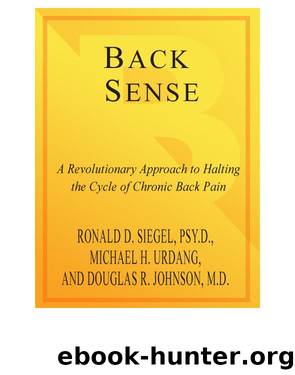Back Sense by Dr. Ronald D. Siegel

Author:Dr. Ronald D. Siegel
Language: eng
Format: epub
Tags: Nonfiction
ISBN: 9780767909716
Publisher: Harmony/Rodale
Published: 2009-01-16T00:00:00+00:00
DEPRESSION
Further long-term consequences of the struggle
We saw in chapter 6 that depression may result from suppressing anger. Depression also comes from learned helplessnessâbeing trapped in pain. Chronic back pain thus often leads to depression. Its symptoms are both mental and physical.
Does your back pain make you feel sad, empty, or tearful? Do you ever feel hopeless or in despair about your back? Do you feel inadequate as an employee, friend, parent, or romantic partner since developing chronic back pain? Do you blame yourself for your back pain problem? Have you lost interest in lifeâs pleasures? Do you ever feel that life is not worth living because of your pain?
Do you easily lose your appetite or eat to excess? Do you find it difficult to sleep or find that you sleep too much? Do you often feel fatigue or experience a lack of energy? Do you have difficulty concentrating or making decisions? Have your lost your usual sexual responsiveness? There can be many causes for any of these symptoms, but when several of them occur together, they usually mean that you are depressed.
Depression takes different forms in different people. You may be sad, or agitated and irritable. One of the worst things about depression is that it can undermine our sense of deserving help with our problems. This is further reinforced by our culture, which tends to see depression as a moral failure rather than a perfectly understandable problem.
When we are depressed, it can be hard to think clearly. Many scientific studies have shown that when suffering from chronic back pain, people think very negatively. We catastrophize, imagining the worst-possible scenario and believing that it will really happen. We remember discouraging moments much more vividly than positive ones. We expect failure. Often we have unrealistically self-critical thoughts, such as Iâm worthless if I canât work. We may even begin to think that we are being punished by God.
Ironically, learning about the true causes of the pain can add to our self-criticism. Many people, understanding that chronic back pain is related to stress, get down on themselves in a whole new way. They blame themselves for being too stressed in the first place or for not handling their emotions better.
For many people, depression begins to lift as soon as they resume activity and find, to their surprise, that they are not crippled. For others, it is necessary to examine the depressive thoughts directly. In the same way that noticing worries helps, noticing depressive thoughts can loosen their grip on us. Take note of how often catastrophic or self-critical thoughts enter your mind. See if you seem to focus on the negative rather than the hopeful. Notice your expectations of failure. You canât force yourself to stop having depressive thoughts, but you will gain perspective and balance by merely observing them.
As you observe your thoughts, be kind to yourself. In the course of getting better, almost everyone feels, I canât believe I didnât realize this sooner! How could I have gotten myself into such a mess? We all develop chronic back pain through a chain of completely natural reactions.
Download
This site does not store any files on its server. We only index and link to content provided by other sites. Please contact the content providers to delete copyright contents if any and email us, we'll remove relevant links or contents immediately.
Men In Love by Nancy Friday(4342)
Everything Happens for a Reason by Kate Bowler(4076)
The Immortal Life of Henrietta Lacks by Rebecca Skloot(3834)
Why We Sleep by Matthew Walker(3782)
The Sports Rules Book by Human Kinetics(3597)
Not a Diet Book by James Smith(2744)
The Emperor of All Maladies: A Biography of Cancer by Siddhartha Mukherjee(2440)
Sapiens and Homo Deus by Yuval Noah Harari(2424)
Day by Elie Wiesel(2251)
Endless Forms Most Beautiful by Sean B. Carroll(2089)
Angels in America by Tony Kushner(2054)
A Burst of Light by Audre Lorde(1984)
Hashimoto's Protocol by Izabella Wentz PharmD(1903)
Dirty Genes by Ben Lynch(1863)
Reservoir 13 by Jon McGregor(1859)
Stretching to Stay Young by Jessica Matthews(1719)
Fat for Fuel by Joseph Mercola(1701)
The Immune System Recovery Plan by Susan Blum(1700)
Boost Your Brain Power in 60 Seconds by Michelle Schoffro Cook(1681)
